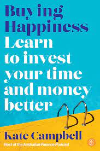6 ways money can buy you happiness

We’re often told that money can’t buy happiness but is that really the case? Kate Campbell thinks money can make you happy if you learn to spend it right. In this edited extract from her book, Buying Happiness: Learn to invest your time and money better, she reveals six ways you can use money to buy happiness.
Time stopped when Ed Sheeran came on stage at the Melbourne Cricket Ground, and for two hours the 108,000 of us in that stadium forgot about our day-to-day worries and just sang our hearts out. For the price of admission, I’d argue that every one of us had successfully bought an evening of pure unbridled happiness – and it was worth every cent.
In 2022 I read Elizabeth Dunn, Daniel Gilbert and Timothy Wilson’s paper ‘If money doesn’t make you happy then you probably aren’t spending it right’ after Ali Abdaal, one of my favourite YouTubers, discussed it on his channel. Something clicked for me when I read that research. I’d known there was something to the idea of buying happiness because I’d seen it in action in the lives of friends, family and my podcast community. I’d experienced it myself at that Ed Sheeran concert. However, this paper drew together a huge list of studies and gave me proof of what I’d long suspected – money can make you happy if you learn to spend it right.
While I can’t promise you that if you increase your personal wealth you’ll never be unhappy again, I can show you some research-backed methods to increase your overall happiness levels using money. Of course, the more money you have, the more easily you’ll be able to use these strategies, but you might be surprised by the differences that some small intentional changes to how you spend your money can make to your happiness. Let’s explore some practical ways you can start using the money you have right now to add value to your life.
1. Smoothing the road ahead
It’s possible to buy back your time by outsourcing tasks you don’t enjoy (or that just drain your time), but there are also emotional – read: happiness – benefits that you can achieve by smoothing the road ahead with money. This is about using your money to make your daily life easier, which can reduce the stress and add happiness to your day. For example, I took my work shirts to the dry cleaner this week, which saved me from having to hand wash and risk burning them with my ironing skills.
Here’s my challenge to you. Think about how you can spend your money to smooth your road ahead. If you have money to spare in your budget, pick one thing to experiment with this week – whether it’s getting a jacket dry-cleaned or paying an accountant to do your taxes. This is also a good opportunity to let yourself think bigger and add some goals to your vision board. For example, though you might not be able to afford it right now, you might like to pay for a cleaner each fortnight in a few years’ time.
2. Experiences > things
One sentence, in particular, stood out to me in that paper on happiness: “Money is an opportunity for happiness, but it is an opportunity that people routinely squander because the things they think will make them happy often don’t.” Society has trained us well to reach for material items, promising they’ll make us happier, but that feeling of excitement when you first buy an item can quickly fizzle out – especially if there wasn’t much intention behind the purchase. In contrast, research shows that it’s the experiences we purchase that tend to bring us more immediate and longer-lasting happiness.
In his book Die With Zero, Bill Perkins describes the way we relive our memories and the happiness we get from that as “memory dividends”. Put simply, memory dividends are the ongoing doses of happiness we experience every time we think back on an experience, such as a special vacation. Not only do you get the benefit of the experience the first time around; it also lives on for years in your memories. I know I’ve felt the effects of this, because when the magic of seeing Ed Sheeran on stage eventually ended – and everyone went home, the happiness I experienced during that event wasn’t over. In fact, it still brings me happiness reflecting back on this memory today.
The ability to adapt quickly is typically considered to be one of humanity’s greatest skills; however, in contributing to the phenomenon of hedonic adaptation, it can have a huge negative impact on our finances. Psychology Today defines hedonic adaptation as the “process by which positive or negative effects on happiness fade over time”. Essentially, we might think a pay rise will make us happier, and it probably will the first time, but if we’re not careful, we’ll quickly adapt our spending to our new salary level and face similar struggles to those we did before. One way to combat hedonic adaptation is to focus less on buying material items and more on purchasing experiences, because we don’t adapt as quickly to new experiences.
Something we don’t pay as much attention to is the role that experiences play in connecting us with others and developing our relationships. Often experiences are shared with friends or family (for example, going to a concert or having Christmas lunch) or allow us to meet new people (such as joining a local netball team or taking evening classes). Research also shows that this social element increases how much happiness we get out of experiences, so bear this in mind as you plan your next adventure or activity.
Sometimes material items can also be experiences, and there’s what researchers call a “fuzzy boundary between these two types of purchases”. However, most consumers were able to categorise their past purchase into one of the categories. Take the books written by my favourite author, Sarah J. Maas, for example. Over the years I have anticipated her book releases, devoured them within days, talked about them with other fans and experienced it all over again by rereading the series years later. These one-off purchases have resulted in significant memory dividends over the years. This shows that money spent on some material items can also be considered investments in happiness, particularly if those purchases will pay ongoing memory dividends.
Although there’s a lot of research telling us to pursue memories over attic fillers, we often struggle to put this into practice because we don’t really stop to think about what purchases – be that of experiences or material items – actually make us happy. So, let’s work on that now.
Make a list of your five biggest material item purchases over the past year (excluding things like rent and utilities) and a second list of your five biggest experiential purchases over the past year. Then reflect on these questions:
- How do you feel looking at and thinking about each list?
- What brings back more memories and feelings of happiness?
- What are some ways you could start using your money to add more experiences into your life? (Think about small things, such as taking a friend out to do an activity, as well as bigger vision board ideas, such going on an overseas family holiday.)
3. Anticipation is half the fun
Think about the times in life when you’ve anticipated an event or getting something you really want for hours, days or even weeks in advance. In the lead-up, you’re visualising your summer holiday, imagining your lifestyle in a new house or dreaming about finally getting to visit the restaurant you’ve heard such good things about. Despite the possibility of feeling nervous, impatient or annoyed while you wait, research shows that the more you anticipate an experience, the more enjoyment and satisfaction you get from it.
This effect is much more evident in anticipating experiences than anticipating acquiring material items. Plus, anticipating positive events in your future is great for your mental health. One study showed that “anticipating a positive event is sufficient to induce a positive emotional state” and allows us to deal with stresses in our life more easily.
Have a look at your calendar. Are there any events coming up over the next six months that you’re looking forward to? This could be a lunch with a friend, a work conference or a concert you’ve booked tickets to. If there’s not, can you book something that you’re going to look forward to?
On top of the happiness-boosting benefits of anticipating future experiences, delaying purchases is typically much better for your finances than purchasing impulsively, on credit or using buy now pay later (BNPL) services.
Let’s reverse BNPL by saving up now and buying later if we still feel like it; save now buy later, if you will. The next time you’ve got your eye on something specific, try this: instead of buying on credit or dipping into your savings: create a goal, open a designated account, work out how much you can reasonably put aside each month and then automate this plan so it happens in the background. Give yourself time to really think about it, visualise and enjoy the build-up of anticipation before you even purchase the experience or item.
4. Spending on others
How much money do you invest in your relationships with friends and family? Research suggests that we’re a lot happier when we spend money on others than we are when we spend that same amount on ourselves. Unfortunately, research also shows that we often get this wrong, believing that we’d be happier spending that money on ourselves.
One of the reasons why spending money on friends and family makes us happier is that it can help with building social ties. Just think about how you feel when you alternate paying for coffee or lunch with a friend. It’s an implicit arrangement, in a way, that you’ll catch up again soon. It demonstrates that you trust they will continue the pattern. Think about how you feel when buying gifts for loved ones (especially surprise ones) or donating money to organisations that matter to you. These actions can create stronger ties to your community and bring you much more happiness than spending the same amount of money on yourself.
It’s definitely easier to be generous with money when you aren’t on a tight budget. Spontaneous dinners out, big gifts and giving money to family, friends and charity are all a lot easier when you have more money. If your budget is tight right now, consider ways to express generosity and strengthen connections that won’t negatively affect your path to getting out of debt or building your emergency fund. For example, this might be having friends over for coffee instead of going out, or perhaps using your time to help a family member set up furniture.
Does all this generosity have a downside? Think about your generosity like a water tank. If you just leave the tap running all the time, chances are it’ll run out before the rain comes to fill it up again. You need to look after yourself as well. Plus, if your tank runs out, you can’t help anyone.
How can you use your money (or time) to connect with or support your friends and family this week? Can you surprise your mum with flowers, buy your friend a coffee or take their dog for a walk? Pick one thing and give it a go, then reflect on how that made you feel.
5. Giving money away
Consider how you can share the resources you have with others, because this has a big impact on happiness. In his popular TEDx Talk, Michael Norton from Harvard Business School shares that spending money on other people makes us happy. He goes on to say that the benefits don’t come just on grand acts of generosity, such as donating $10,000 to a local school. The small acts have just as much of an impact on your happiness. For example, spending money at the school fair, buying someone a coffee or donating $50 to a fundraiser online.
Norton also highlighted a 2008–09 survey conducted by the Gallup World Poll that found in 120 of 136 countries, individuals who donated to charity in the previous month reported higher levels of life satisfaction. One point to note with this research, says the University of Oxford’s Andreas Mogensen, is the importance of knowing how an organisation is going to use your money. According to the research, the happiness boost is greater when it’s clear exactly how the money helps others.
Many of us want to give more to others but don’t feel we have the time to do so. One way to change this is by prioritising it in your budget through a regular direct debit arrangement with a charitable organisation or allocating $100 a month in your budget for giving to others. You could also consider using organisations like The Life You Can Save, founded by moral philosopher Peter Singer, who do the research for you in finding the most effective places for you to donate your money.
Challenge yourself to give away $10 in the next 24 hours, perhaps by paying it forward, putting some coins in the tip jar or donating to charity, and reflect on how it makes you feel.
6. The effects of quantity and novelty
Sometimes lots of low-cost experiences and purchases can be better than one more expensive one. Although those big experiences such as overseas holidays are fantastic, they might mean less money for happiness-boosting purchases throughout the year. This comes back to the idea of hedonic adaptation, whereby the brain adapts quickly to one big experience or purchase, but is slower to adapt to more regular ones. After we sleep off the jet lag from our big trip, we’re quickly looking for the next boost of happiness.
I make the choice to buy coffee with friends on the weekends because I find that act brings me more happiness and contentedness – not just in the moment, but also throughout the week – than I feel I would get if I spent that money on a weekend away once a year. It comes back to your values, goals and preferences, though, so it’s worth experimenting with this idea. Think about low-cost ways of providing yourself with regular happiness boosts. This might look like a weekly exercise class with friends, purchasing a new book once a month or trying a new cafe each weekend.
Another way you may be able to elevate the happiness that money can buy is by mixing up how and what you spend your money on. According to the experts, you can use the following variables to improve your brain’s perception of an experience:
- novelty (you haven’t experienced it before)
- surprise (you didn’t expect it to happen)
- uncertainty (you’re not entirely sure what it is)
- variability (it keeps changing).
One obvious way to apply the theory of novelty to buying happiness is to do new and interesting things with your money – visiting a country you haven’t been to before, for example, or skydiving if you’ve never done it – but don’t forget our discussion about quantity. Even if you’re doing something small, such as going out for coffee on the weekend, you can still introduce an element of novelty to improve your experience. For example, you could go to a new coffee shop, shout your friend a coffee or change up the time of day. You’d still be spending a similar amount of money, but you’d get a different experience – and you might just enjoy it more.
You can take this a step further by pairing up with a friend. Alternating each month, one of you could book a surprise activity, giving the other just the time, location and dress code. This is a great way to mix things up and have experiences you might not have chosen on your own.
Think about some ways you can spend your money differently to add more novelty to and increase the quantity of your purchases. This is one way to take the money you’re already spending on your wants each month, making some small tweaks and getting an extra happiness boost from it.
How I buy happiness
Someone once told me if you’re asking yourself whether you’re happy, there’s a good chance you’re not completely happy. Still, I think a little self-reflection and proactiveness in this area of life can be a very good thing. Writing this book has pushed me to slow down and think about all the ways I’ve bought happiness in my life: through experiences, material items and just the time to slow down with loved ones.
Reflecting on how I’ve bought happiness recently, I can see that I’ve made a few big purchases that have been worth every cent for the happiness they brought, including a month-long solo travel experience through Europe, tickets to live performances, gifts for friends and family, and two new bookshelves.
Some of these bigger items, such as going overseas, required setting goals and saving up for months or years in advance. I needed to get a handle on my spending, manage my budget, increase my income and get comfortable with delayed gratification. Having spent the time working out my values and priorities, when I made those purchases, I was confident they would make me happy – and they did.
However, it’s worth remembering that bigger and more expensive doesn’t necessarily mean better. There are lots of smaller things I’ve also enjoyed in that time for little or even no cost, such as reading a good book, walking in nature, sharing a freshly brewed pot of tea with a friend and chatting on the phone with my parents.
My challenge to you now is to write a list on your phone of small, inexpensive things that make you happy. Then, when you’re having a tough day or you just need a pick-me-up, pull out your list and tick off one of those activities.
How other people buy happiness
It can be challenging to identify ways that you can spend your money and time to buy happiness, so I crowdsourced responses from my community to get you thinking. I’ve selected a few responses to each of my questions to show here, but I have much longer lists for you to explore at buyinghappiness.com. au – be sure to check them out and add your own ideas too!
First I asked my community for a material purchase they’d made recently that had increased their happiness levels. Here are some of their responses:
- A hydro flask! The best investment I have made instead of wasting my money on bottles of water each time I go out.
- I’ve allowed myself the extra money to have all groceries and fruit/veg delivered. It’s a game changer for a working mum of three children. Saves time and stress.
- A trampoline for my two-year-old daughter for her birthday. We spend hours on it together each week and have so much fun.
- Investing in braces. My family couldn’t afford to take us to the dentist regularly and investing in straighter teeth as an adult is for me one of the best things I’ve bought for myself.
- This would hands down be my new camera. I want to document more of my life and to celebrate the people around me so I can look back in the future and be reminded of the small, happy, little moments.
Then I asked about experiential purchases they’d made recently that had increased their happiness levels. Here are some of the responses:
- Camping trip to the Flinders Ranges. Takes 5 hours from Adelaide (in Australia), so expensive with petrol, and though the booking fees aren’t too expensive it does all add up. Despite spending time and money getting there, being in nature makes such a difference in my happiness levels.
- My gym membership! I train at a low-cost gym up front for 12 months and make it a priority to go. Getting my butt there makes me feel accomplished regularly as juggling life outside of work is a constant challenge.
- A dog. We were putting it off due to costs, but we made room in the budget as it was companionship my partner and I wanted for a while.
- A beginner’s pottery class with my daughter. We spent time together, had a laugh, learnt a new skill and came home with some bowls we can now use to remember the experience.
I also asked what they think has been the lowest-cost activity or purchase that has had the greatest impact on their happiness. Given we’re facing rising living costs and many of us have cut back on our spending, I want to push you to think about those lower-cost parts of your life that still have a big impact on your happiness. This is what they said:
- Meeting in the park with friends so that our little ones can run around and we can catch up.
- Going for a walk with my mentor at work. The walking part is free, but occasionally we grab a coffee. I look forward to this every fortnight.
- Buying a serve of hot chips!
- Enrolling my son in swimming lessons and watching his face light up when he gets in the pool.
- Friday night dinner with friends. We always eat in, taking it in turns to cook. We all look forward to hanging out on Friday nights in the comfort of our homes – no Ubers, no expensive drinks. It’s the highlight of my week.

This is an edited extract from Buying Happiness: Learn to invest your time and money better (Major Street Publishing $32.99), republished with permission.
Cover image source: Rawpixel.com/Shutterstock.com
This article was reviewed by our Editorial Campaigns Manager Maria Bekiaris before it was updated, as part of our fact-checking process.






